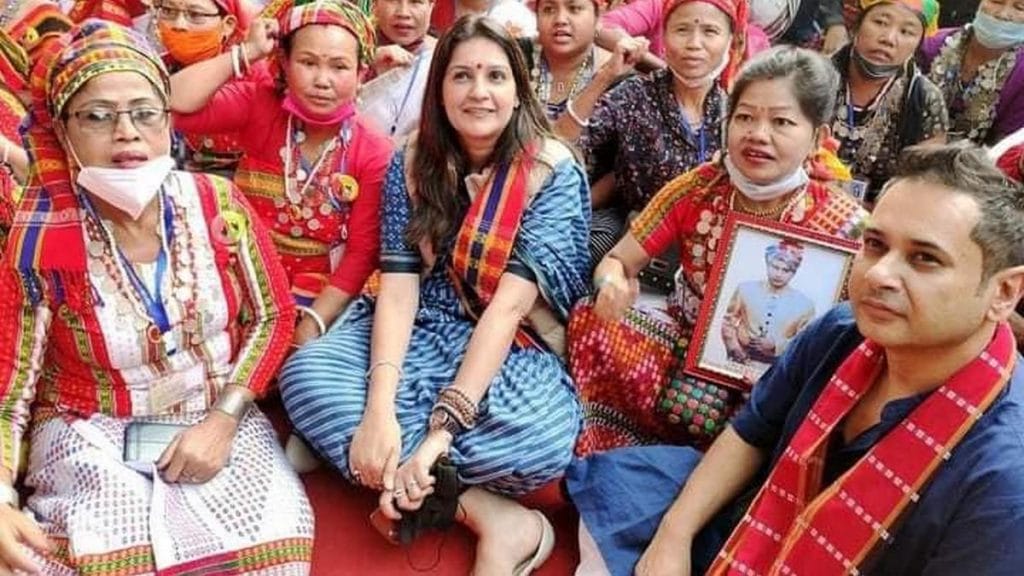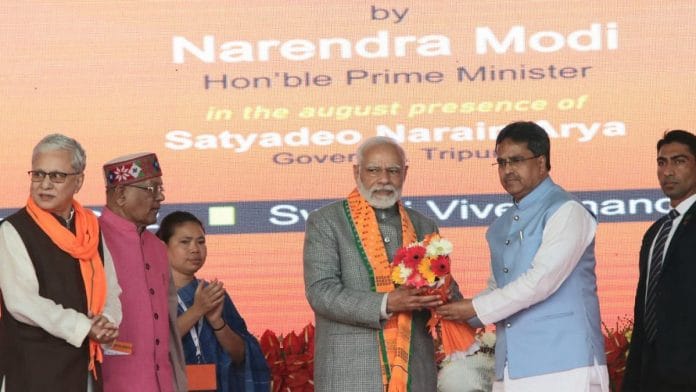New Delhi: When Prime Minister Narendra Modi visited Tripura earlier this week, he had two core messages for state BJP leaders ahead of the February assembly elections. One was to showcase the Gujarat model of electoral success as an example and the other was to reinforce the importance of being fully prepared in tribal areas.
This comes amid growing concern in the BJP about the expanding influence of Pradyot Bikram Manikya Debbarma, chairman of the Tipraha Indigenous People’s Regional Alliance (Tipra) Motha.
According to state BJP leaders, the PM held a closed-door meeting with a core group of party members during his visit to state capital Agartala Sunday, in which he discussed strategies for the upcoming elections.
“The PM told us to learn from Gujarat, where the party was able to register a resounding victory because the organisation was robust, deep-rooted at the booth level, and fought the election with a united spirit,” said a BJP MLA who was present at the meeting.
“He asked cadres to reach out at all the booths and asked if they were active on social media. His thrust was to propagate the good work of the government proactively on social media.”
In addition to this, said the MLA, the PM “enquired about activities and party election preparedness, particularly in tribal areas”.
At a public rally in Tripura, too, Modi specifically mentioned that the BJP had swept 24 out of 27 reserved tribal seats in Gujarat, which went to polls earlier this month.
Calling the BJP the “first choice of tribal society”, he listed out the ways in which the party had worked for the community’s welfare in education and employment. “The budget for the tribal community which was Rs 21,000 crore is Rs 88,000 crore today,” he said.
This emphasis on tribes comes at a time when the BJP is on somewhat unsure footing in Tripura, where it has been in power since 2018 in an alliance with the Indigenous People’s Front of Tripura (IPFT), with which it also plans to fight the 2023 elections.
The past year has seen seven MLAs quit the combine. Of these, four have joined the Tipra Motha, which is demanding a separate state called Greater Tipraland for indigenous communities.
Led by Pradyot Debbarma, an ex-Congressman and scion of Tripura’s erstwhile royal family, TIPRA Motha last year swept the elections to the Tripura Tribal Areas Autonomous District Council (TTAADC), a constitutional body which has jurisdiction over the state’s tribal belt, encompassing about two-thirds of Tripura’s geographical area and a third of the population.
Of the total 28 elected seats in the TTAADC, the Tipra Motha contested in 23 along with its ally Indigenous Nationalist Party of Twipra (INPT) and won 18. The BJP won nine seats, an independent candidate got one, and the IPFT, Congress, and Left Front all registered ducks.
Out of the state’s 60 assembly constituencies, Tipra Motha reportedly plans to contest in 45-50 seats. Twenty seats in Tripura are reserved for tribals and the community is numerically significant in another 10. In 2018, the BJP won 10 seats in the tribal belt and IPFT bagged eight, but the 2021 TTADC result and the subsequent trickle of MLAs to Tipra Motha has the BJP worried.
Also read: Change of Tripura CM shows BJP failed in its commitment, will help us, say opposition parties
Concerns about ally IPFT, growing influence of Pradyot
When the BJP ended the Left Front’s 31-year reign in 2018, it started its Tripura innings on a high note. Since then, though, significant problems have appeared.
In May this year, with an eye on the upcoming elections, the party replaced its ex-movie actor chief minister Biplab Kumar Deb with Manik Saha, reportedly due to factionalism in the party and with MLAs leaving for greener pastures.
In October last year, BJP MLA Ashis Das switched over to the Trinamool Congress (and has since left it). Then in February this year, BJP MLAs Sudip Roy Barman and Ashis Kumar Saha moved to the Congress, while in September, Burba Mohan Tripura joined Tipra Motha.

Alliance partner IPFT is also causing the BJP some heartburn. Not only is the party’s support base seen to be eroding, three MLAs joined the Tipra Motha this year. The latest to do so was former minister Mevar Kumar Jamatia, who quit the ruling combine last month claiming that the BJP did not allow him to work enough for the welfare of the people. Before him, two other IPFT MLAs reportedly joined Tipra Motha— Dhananjoy Tripura and Brishaketu Debbarma.
“The influence of the IPFT is decreasing in the tribal belt and we are concerned about the growing support that Pradyot Debbarma is getting,” a state BJP minister told ThePrint.
“Many leaders in the [BJP] want to dump IPFT and contest elections independently in the tribal belt, but the high command is first taking all feedback before it makes a decision. Any kind of wrong messaging could harm the party in sensitive tribal areas,” he added.
According to Fanindra Nath Sharma, the BJP’s organisational in-charge of Tripura, tribal seats are high on the priority list ahead of elections, but he expressed some reservations about the IPFT’s ability to galvanise support.
“Last time, we won 25 seats in the general category and 10 tribal constituencies to achieve majority. We will have to work on tribal seats this time too. We have made Draupadi Murmu the first tribal woman President of India and our work on empowering tribals will push us… though this may not be not true for our alliance partner.”
When asked about the IPFT, Union minister of state Pratima Bhoumik, who is from Tripura, admitted that “our alliance partner is a concern for us”. She, however, dismissed Tipra Motha as a “creation” of the Communist Party of India (Marxist), or CPM, which had led the previous Left Front state government, and claimed it was only “fooling tribals with the demand for Greater Tipraland”.
Outreach failed, attack mode on
The BJP made attempts to stitch an alliance with the Tipra Motha, but these failed, acknowledged another party functionary.
“We offered [Pradyot Debbarma] a Union cabinet also, but he refused,” this leader claimed. “We are calculating that fighting separately could either cut tribal votes and benefit the BJP, or it could send the wrong message to the community. The party high command will take a call after considering all facts.”
Notably, Rashtriya Swayamsevak Sangh (RSS) chief Mohan Bhagwat paid a ‘social call’ to Debbarma’s mother in August, leading to speculation that this was an outreach attempt for the BJP. While the RSS denied that politics had anything to do with this meeting, BJP sources told ThePrint that it was indeed geared towards thawing Debbarma’s stance towards the BJP.
In September, though, BJP general secretary (organisation) B.L. Santhosh reportedly pulled up the Tripura unit in the wake of the wave of defections and told them to stop angling for an alliance with Tipra Motha. Instead, he advised them to focus on groundwork.
Party sources said that the BJP leadership has now told the state unit to hold small meetings in all zonal and sub-zonal offices of the TTAADC in tribal-dominated areas and to raise issues regarding the Tipra Motha’s performance in the body.
Earlier this month, the BJP Tribal Morcha held eight zonal meetings and several smaller ones to discuss alleged “corruption” in the purchase of computers, construction work, and other welfare measures.
BJP MP Rebati Tripura told ThePrint that “there is no accountability of funds sent by the central government to the council” and that misappropriation was suspected.
“We are submitting a chargesheet at the zonal office. Our small meetings get good traction at many places. People understand that one a two-engine government (the same ruling party at the Centre and state) can bring development to them,” the BJP MP said.
Rumblings within BJP
When Prime Minister Modi was holding his meeting with Tripura leaders, one purportedly spoke up and said that the party should have done more to capture the imagination of the tribal community.
Another BJP minister told ThePrint: “We have been demanding to raise the number of TTAADC seats from 30 (28 elected and two nominated by the governor) to 52. The state assembly even passed a resolution to this effect (in 2020), but the central government has not acted on this. This has not gone down well in the tribal segment.”
The minister added that another demand to include the tribal Kokborok language in the 8th Schedule of the Constitution (which lists India’s official languages) has also not been heeded.
“We can’t promise a separate state like the Tipra Motha, but fulfilling these two demands can create more goodwill for the BJP among the tribes, which constitute 30 per cent of the state’s population,” he argued.
Other than disagreements over how tribals can be wooed, another issue assailing the Tripura BJP is infighting in the state unit — something that is believed to have played a role in the party’s loss in the Himachal Pradesh elections.
“After Biplab Deb was replaced, there has been a lack of cohesiveness in the party and government. Any rebellion can harm us badly,” said a Tripura BJP office-bearer.
He added that the CPM, too, was a threat and there were concerns it could be “gaining traction”.
In the 2018 elections, the CPM was reduced to 16 seats in the assembly (down from 50 in 2013), while the BJP bagged 36 (after netting zero in the previous election). The kicker, though, was that the CPM’s vote-share was only 1 per cent less than the BJP in the last election, which is another worry for the party ahead of polls.
(Edited by Asavari Singh)
Also read: Polls nearing in Tripura, BJP ally IPFT loses 3rd MLA to royal scion’s party, Tipra Motha






